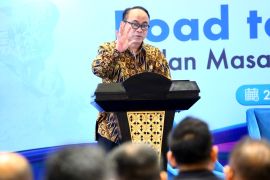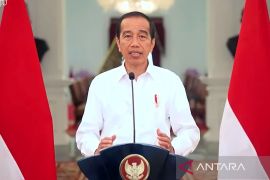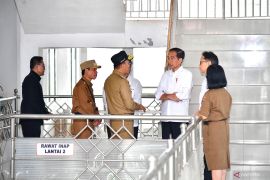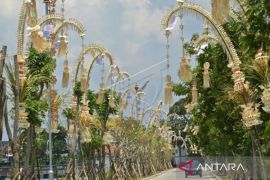Public had the right to obtain further information about the concept.Jakarta (ANTARA News) - President Joko Widodo needs to elaborate on the direction and implementation of the maritime axis concept he had announced during the July 2014 presidential election campaigns.
At a discussion about Indonesias self-reliance as a global maritime axis here on Thursday, Director of Archipelago Solidarity Foundation Engelina Pattiasina stated the public had the right to obtain further information about the concept.
"One of the Jokowi-JK presidential tickets missions, as per their election campaigns, was to make Indonesia a self-reliant, advanced and strong maritime state whose priority will be national interest," she added.
Engelina, who is also a former member of the Indonesian Democratic Party of Struggle (PDIP) faction in the House of Representatives (DPR), pointed out that the maritime axis concept contains international, regional and domestic dimensions and covers multi-sector interests.
The absence of any explanation on the concept has led to concerns that the Indonesian maritime policy will complement the grand concept of Chinas Maritime Silk Route, she said.
"This silk route will be very strategic. Looking at Chinas serious campaigns in the region, it seems the route will most likely be realized," she remarked.
The plan to help in the realization of the silk route project has led to questions such as how will Indonesia benefit by involving in the project, she explained.
Indonesia must be consistent with its vision to emerge as the main player in the global maritime sector because it has all the resources required to become a global maritime axis, she noted.
"Therefore, if Indonesia joins the silk route project, it might affect our sovereignty aspect," she cautioned.
The government of President Joko Widodo and Vice-President Jusuf Kalla must be aware of this situation, she added.
"The challenge before the Jokowi-JK government is to come up with an idea to increase Indonesias bargaining power in the global maritime sector as Indonesia is located in the global maritime axis," she stated.
At the East Asia Summit in Nay Pyi Taw, Myanmar, on Thursday, President Jokowi reiterated that Indonesia will focus on developing its fisheries industry and infrastructure to support its aspiration to become a global maritime axis.
"Indonesia, a maritime nation, wants to become a global maritime axis, which can bring prosperity to its people," he noted.
Jokowi affirmed that Indonesia will lay greater emphasis on managing its marine resources, developing the fisheries industry, and using fishermen as a locomotive to drive its economy.
"Our maritime resources must be used for the welfare of our people," he emphasized.
The President pledged to boost the development of maritime infrastructure such as sea tolls, deep-sea ports, shipping industry, and maritime-based tourism.
Jokowi also highlighted the importance of maritime diplomacy that will facilitate better cooperation between Indonesia and its partnering countries in solving future global challenges.
"Together, we must solve conflicts at sea such as illegal fishing, the violation of maritime borders, piracy, border disputes, and marine contamination," Jokowi noted.(*)
Editor: Heru Purwanto
Copyright © ANTARA 2014











